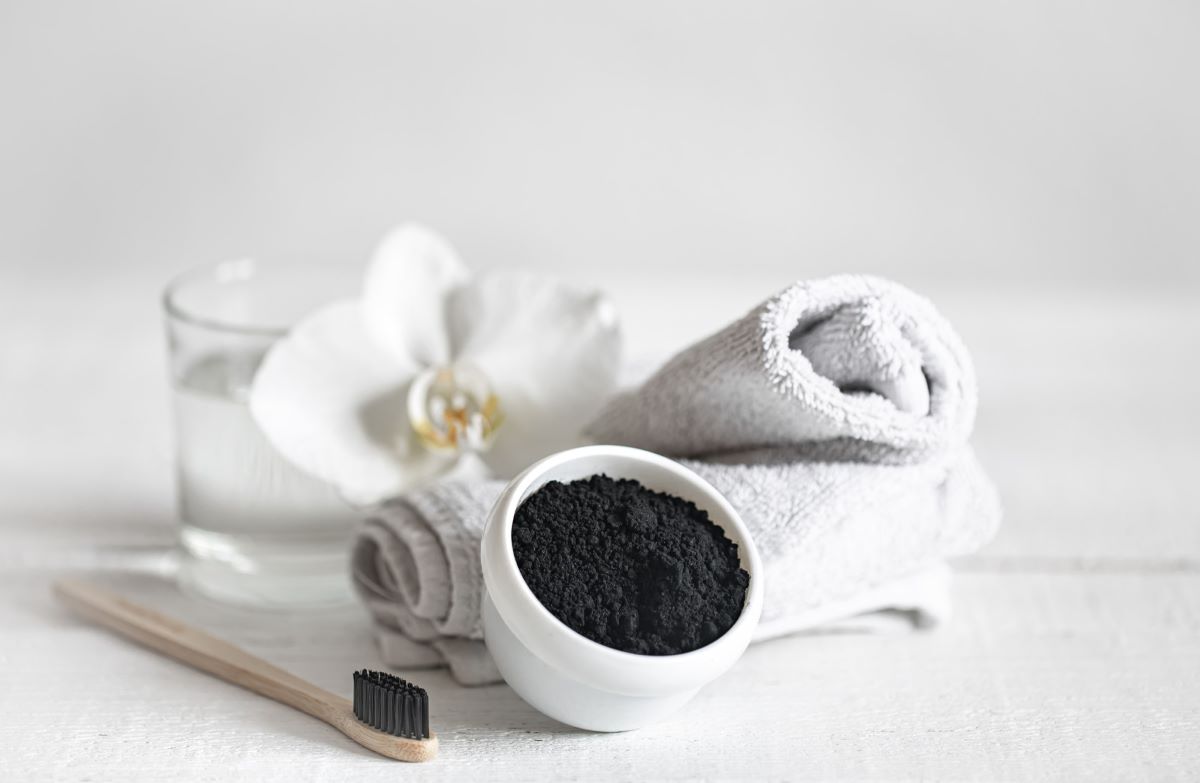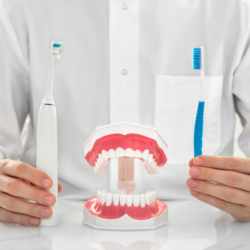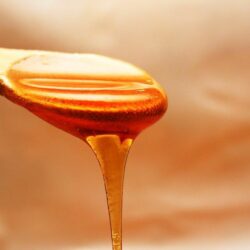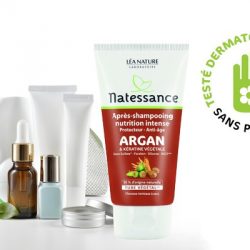Who hasn’t dreamt of sporting a radiant, perfect white, pearly smile like the stars of Hollywood ? Dazzling white teeth are often associated with good health. But immaculate white has never been the natural colour of teeth. Made up of a thin layer of translucent enamel under which most of its material (dentine) lies, its original colour varies from ivory to light beige. Like eyes and hair, the shade depends on each person’s genetic make-up. So there’s no need to pick on those poor teeth when they’re not as milky as they look in toothpaste adverts.
That said, teeth inevitably have an aesthetic aspect, which can be a source of greater self-confidence or, on the contrary, a source of complexes. So if you find that your smile has turned yellow, there are natural
there are natural solutions to help your teeth regain their beautiful whiteness. Vegetable charcoal is one of them. But how and when should you use it? We tell you all about it!
What is vegetable charcoal?
A. Definition and origin
Vegetable carbon, also known as activated carbon, is a natural product obtained by carbonising vegetable matter such as wood, coconut shells or bamboo residues. This process, which takes place at high temperatures and in the absence of oxygen, transforms the material into a concentrated form of carbon. Historically, vegetable charcoal was discovered by ancient civilisations who used burnt substances for their purifying properties. Over time, its production has been refined, resulting in a purer, more efficient product.
B. Composition and properties
The porous structure of vegetable coal is what gives it its remarkable properties. These pores, formed during the carbonisation process, create a large adsorption surface, enabling the charcoal to capture impurities, toxins and certain bacteria. This adsorption phenomenon is crucial for its applications in dental health, particularly for teeth whitening. Activated charcoal is able to adsorb stains and pigments from tooth enamel, contributing to a whitening effect. In addition, its antibacterial properties help to maintain optimal oral hygiene, reducing bacteria and toxins that can cause problems such as bad breath and tooth decay.
C. An age-old ingredient in cosmetics
Scrubs, peel-off masks, cleansing gels or foams, exfoliating masks, depilatory waxes and toothpaste… with activated charcoal. More and more of the cosmetics available in pharmacies, drugstores and even supermarkets now contain this curious ingredient with surprising virtues. In fact, vegetable charcoal has been used since ancient times for its cleansing and detoxifying action. Quite naturally, the pharmaceutical and cosmetics industries have adopted it for the formulation of ‘purifying’ products.
Presented in powder, paste, tablet or capsule form, pure or mixed with other ingredients, vegetable charcoal is obtained by calcining wood or other carbon-rich plants (walnut shells, bamboo, etc.) in an oxygen-deprived environment. It is therefore concentrated in pure carbon, the porous texture of which has a very high absorption capacity, enabling it to remove impurities that adhere to its surface.
Historical use of charcoal in dental care
A. Traditional uses
Since ancient times, charcoal has been used in various cultures for its dental care benefits. The ancient Egyptians, for example, used charcoal to create dental powders, valuing its purifying and deodorising properties. In some Asian cultures, charcoal was used not only to clean teeth, but also to promote fresh breath. These traditional uses were based on charcoal’s natural ability to absorb impurities and odours, an empirical discovery that laid the foundations for its modern use.
B. Evolution towards modern dentistry
With the advent of modern science and a greater understanding of the chemistry of charcoal, its role in dentistry evolved. Technological advances have made it possible to produce a finer and more effective activated charcoal, making it more suitable for everyday use and safe for tooth enamel. Today, vegetable charcoal is incorporated into a variety of dental care products, such as toothpastes, whitening powders and even certain types of toothbrush. This reflects a growing recognition of its oral health benefits, as well as a trend towards more natural and environmentally friendly personal care solutions.
C. Vegetable charcoal and tooth care
Many ‘bad’ habits (too much tea, coffee, citrus fruit, smoking, frequent or inappropriate brushing, etc.) attack the enamel and discolour or yellow the teeth. The first thing to do
is to adopt a healthy diet and lifestyle! Vegetal charcoal then becomes a complementary treatment, to restore the whiteness of teeth and make it last. It does this by neutralising the particles responsible for stains and yellowing of the teeth.
Like a magnet that attracts iron, vegetable charcoal ‘sucks up’ and removes impurities and food residues, as well as microbes from the mouth, teeth and gum line. Again thanks to its porosity, vegetable charcoal has an exfoliating effect that removes stains deposited on the enamel.
Can charcoal be used to whiten teeth?
A. Natural whitening properties
One of the most remarkable qualities of vegetable charcoal is its ability to naturally whiten teeth. Its porous structure allows it to absorb stains and pigments that accumulate on tooth enamel, such as those from coffee, tea, red wine and tobacco. Unlike chemical whitening agents, which can be abrasive and cause tooth sensitivity, vegetable charcoal offers a gentler method of whitening. It helps restore the natural whiteness of teeth without damaging the enamel, making this method particularly suitable for regular use.
B. Benefits of vegetable charcoal for oral health
As well as its whitening effects, vegetable charcoal has a number of other benefits for oral health. Its antibacterial and anti-inflammatory properties help maintain a healthy mouth by reducing harmful bacteria, which can reduce the risk of cavities and gum disease. Activated charcoal also helps to balance the pH in the mouth, which is beneficial for preventing demineralisation of tooth enamel and promoting the overall health of the oral cavity. By absorbing toxins and impurities, activated charcoal can also contribute to fresher breath, a significant benefit for daily hygiene.
Scientific perspective on the effectiveness of charcoal in whitening teeth
A. How charcoal whitens teeth
From a scientific point of view, the effectiveness of vegetable charcoal for teeth whitening lies in its adsorption mechanism. Unlike absorption, where substances are ingested or assimilated, adsorption involves one substance (in this case, the stains and pigments on the teeth) attaching itself to the surface of another (the activated charcoal particles). Vegetable carbon, with its porous structure and high specific surface area, attracts and retains staining compounds present on teeth, such as those from coffee, tea or tobacco. This ability to remove surface stains can make teeth visibly whiter after regular use.
B. Research and studies supporting its use
Several scientific studies have explored the benefits of vegetable charcoal for teeth whitening. A study published in the Journal of the American Dental Association showed that some toothpastes containing activated charcoal can be effective in removing external dental stains. However, it is important to note that results may vary depending on the quality and concentration of the charcoal used, as well as the duration and method of application. Further research is needed to establish clear guidelines for its optimal use, but current evidence suggests that activated charcoal can be a natural and effective method of improving smile aesthetics.
Vegetable charcoal toothpaste in pharmacies: which one to choose?
The Gifrer laboratories offer a wide range of simple, authentic products with 99% natural ingredients.
- Gifrer Bicare Plus Charcoal Whitening Toothpaste 75 ml is a toothpaste enriched with plant charcoal powder, a natural polishing agent that works right into the finest grooves of the teeth, for deep cleaning and extra-gentle polishing. This toothpaste also contains fluoride and hydrated silica to protect enamel and completely remove plaque and stains, respectively.
- For those who prefer products with a minimum of ingredients, there’s also Gifrer Bicare Charcoal Whitening Powder 60G, made with only vegetable charcoal powder and sodium bicarbonate. Two natural, environmentally-friendly active ingredients that promise you a radiant smile and impeccable oral hygiene.
- And there’s nothing to stop you adopting the Gifrer Bicare Bamboo To othbrush with charcoal-infused bristles. It helps to remove plaque
while respecting tooth enamel. It’s also an environmentally-friendly alternative to plastic toothbrushes. Bamboo is 100% recyclable and biodegradable.
Alternatively, the recipe for making homemade activated charcoal toothpaste is very simple: pour the charcoal onto your toothbrush, add a little water and brush as you would with an ordinary paste. Once you’ve finished brushing, rinse your mouth thoroughly. But be careful: charcoal becomes abrasive if you use it too much. If used too often, it can cause irreparable damage to the enamel. Brushing with activated charcoal toothpaste should therefore only be done occasionally (after eating highly pigmented foods such as wine or blackberries). At most, once a week, depending on the condition of the enamel, and ideally once or twice a month.





